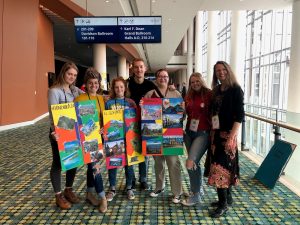Each year the UNC/Duke Consortium for Latin American &Caribbean Studies offers competitive fellowships for scholars who want to use our library resources. Priority goes to researchers from officially recognized Historically Black Colleges and Universities, Predominately Black Institutions, Minority Serving Institutions, and community colleges. Holly Ackerman talked with the two fellows selected by the Duke Libraries for 2019-2020. Below is the interview with Prof. Rachel Chrane. See the interview with Dr. Shearon Roberts at https://blogs.library.duke.edu/blog/2019/08/22/a-interview-with-shearon-roberts/

Tell us a little bit about yourself. Walk us through your CV.
I grew up in Texas, but I’ve spent most of my adult life teaching Spanish and English as a Second Language at Lees-McRae College in the mountains of North Carolina. I lived in Paris, France for a year, thanks to a Rotary International Scholarship that allowed me to study French literature, culture and language at the Sorbonne. I also taught Spanish at The Hebrew Academy of Greater Washington, DC, an Orthodox Jewish prep school. I enjoy learning languages and connecting with other cultures, and I believe the United States is a stronger nation because of our diversity.
When I see the people from Central America in the migrant caravan walking to the United States, I see people who will make our country stronger and more vibrant. But, when I see how they are treated at the border and portrayed on the news, I realize that it’s time for me to get out of my comfort zone and discuss the United States’ role in creating the caravan crisis.
As I shared my uncomfortable research with my Spanish students last year, we realized that we had to share this information with anyone who would listen. In March, I took students to the bipartisan Unrig Summit in Nashville, where we made a presentation about U.S. Involvement in the Caravan Crisis. People in the audience were shocked by the information we shared and they wondered why this information isn’t discussed on the news. It is sometimes difficult to believe information that doesn’t match the version of reality that is portrayed on television. The quote attributed to Mark Twain is often true: “It’s easier to fool someone than to convince them that they have been fooled.”

What was your research project this summer?
My research project focuses on U.S. involvement in the Northern Triangle: Guatemala, El Salvador and Honduras. I want to know as much as I can about why the people in the migrant caravan are willing to leave their homes, their culture and their ancestral burial grounds to walk more than two thousand miles to the United States. And, now that so many Central American people are here seeking asylum, I want information on what we should be doing to honor the asylum process?
How will the information you gathered at the Duke Libraries be used?
The information I am gathering at the Duke Libraries will be the basis for a spring course at Lees-McRae College: Spanish for Social Justice. In this course, we will spend the first half of the semester looking at the Central American Free Trade Agreement (CAFTA) and U.S. involvement in Guatemala, El Salvador and Honduras.
We won’t be content to learn about the Central American crisis simply for knowledge’s sake. So the second half of the semester will focus on getting involved in our communities to help spread a deeper understanding of the crisis in Central America.
I cannot thank The Consortium enough for their generous research grant and the opportunity to consult with scholars at Duke University and at UNC Chapel Hill. I am truly humbled by this amazing opportunity.
What interested you most during your stay?
I was most interested in the people I met and how genuinely kind and helpful they are. Dr. Corin Zaragoza Estrera started working with me before I arrived; helping me navigate the wealth of resources at Duke and UNC Chapel Hill. Dr. Holly Ackerman has helped me tremendously as I explored Duke’s vast library, and she continues to help me find valuable resources for my research.
I also had the honor of talking with the former Ambassador to Venezuela, Patrick Duddy, who is the Director of the Duke Center for Latin American and Caribbean Studies. Natalie Hartman, the Associate Director, and Ambassador Duddy made it possible for me to attend the First Annual Conference on Security, Migration, and Rule of Law in the Northern Triangle of Central America while I was in Washington, D.C. in June. At the conference, I met Norma Torres (D-California) and I was grateful to get to ask her questions about her perspective on CAFTA.
The experience has simply been amazing, and it is not over! I look forward to returning September 19 to hear the Conversation with the UN High Commissioner for Refugees, Filippo Grandi.


